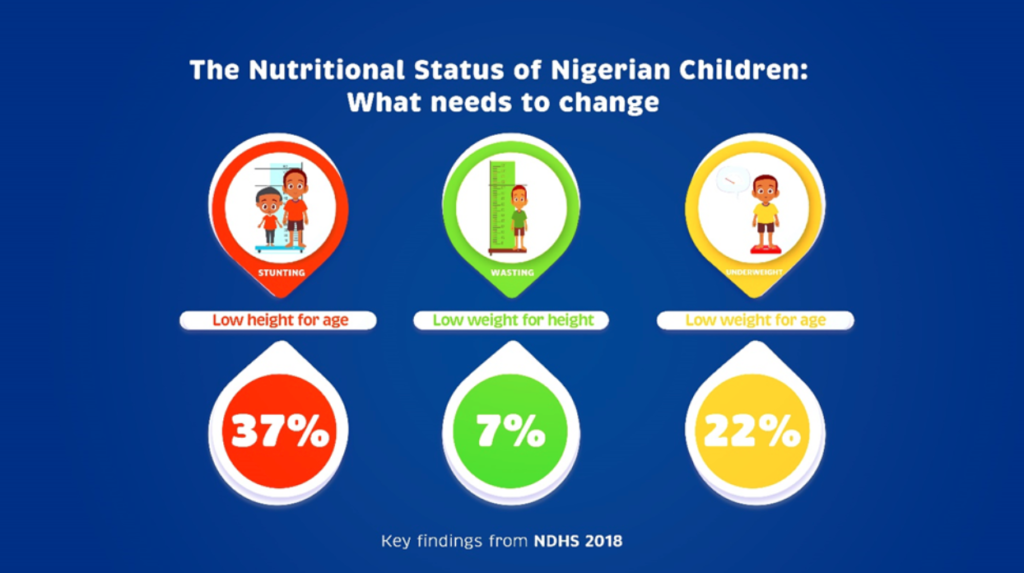Child malnutrition remains a public health problem in Nigeria. Child growth is the most widely used indicator of nutritional status in a community and is internationally recognized as an important public health indicator for monitoring health in populations (WHO).
Childhood under-nutrition is characterized by failure to grow. Height-for-age (stunting), weight-for-height(wasting) and weight-for-age (underweight) are standard indices of physical growth that can be used to assess nutritional status.
The Nigeria Demographic and Health Survey 2018 revealed that stunting amongst children under 5 years of age in Nigeria is at 37% and has remained the largest burden of malnutrition, with many states in the North recording prevalence above 40%. Furthermore, findings from the Global Nutrition report reveals that Nigeria has the second highest number of stunted children in the world after India. That this has grave implications for Nigeria’s future leaders is an understatement.
For example, stunting is associated with suboptimal brain development, which has long-lasting harmful consequences on cognitive ability, thereby affecting school performance and possibly, career development or future earnings (UNICEF, 2013).

Needless to say, this leaves much to be desired as every one of these statistics represent the lives of the very ones we are supposed to nurture and protect. Attempting to change the narrative demands that we look into one of the major factors behind the gloomy statistics that we are faced with. POOR NUTRITION.
A pertinent question then arises: what are they eating, what needs to change? Food consumption patterns reveal that the typical diet of the Nigerian child is suboptimal consisting predominantly of carbohydrates and lacking quality protein and key micronutrients important for proper growth and development.
The goodness of Milk
Milk, considered one of nature’s most nutrient dense foods offers a world of benefits for children. Considered a nutrient powerhouse, it consists of carbohydrates and fats for energy, proteins for development and repair, as well as several vitamins and minerals that are essential in a child’s diet. The presence of calcium, phosphorus and vitamin D in milk supports the healthy development of bones and teeth in children.
Breast milk is the best for babies and of course the gold standard for infant feeding. Rich in all essential nutrients including immunological factors, it provides complete nutrition for children to achieve their highest potential in physical growth and brain development. The World Health Organization recommends that infants should be exclusively breastfed for the first six months of life after which appropriate complementary feeding should be commenced while breastfeeding is continued up to at least two years. Afterwards, it’s important that milk remains a vital part of a child’s diet till adolescence and beyond.
Also according to the Food and Agriculture Organization of the United Nations, Milk and dairy products have been successfully used in the prevention and treatment of moderate and severe malnutrition in children. A well-balanced growing-up milk, tailored specifically to their nutritional requirements, can serve as a valuable addition to their daily diet by providing substantial amounts of daily-required (essential) nutrients including DHA, an essential fatty acid critical for brain development. Peak 456 growing-up milk is specially formulated with DHA and other key nutrients to support their physical growth and brain. It is specially formulated in accordance with internationally recognized RDAs guidelines.
The importance of milk as part of a healthy and adequate diet for children cannot be over-emphasized. As we celebrate World Milk Day, it is a call to action for Nigeria as a Nation to do more with milk as it can serve as a nutritional safety net in bridging the gaps between the RDAs and actual intake of some key nutrients in the diet of our future leaders. Happy World Milk Day!